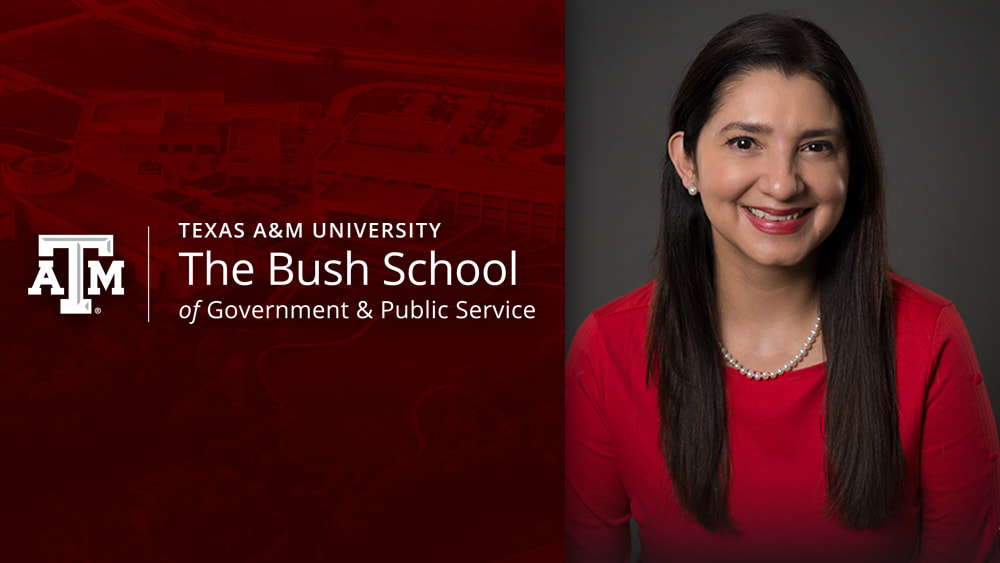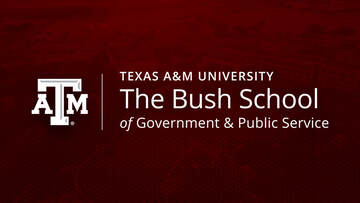|
Thirteen distinguished faculty members from across Texas A&M University have been honored as 2021 Chancellor’s Enhancing Development and Generating Excellence in Scholarship (EDGES) Fellows. Dr. Kalena Cortes, Verlin and Howard Kruse ’52 Founders Associate Professor at the Bush School of Government & Public Service, was one of the award recipients.
The fellowships — which come with more than $7.7 million in funding — are just the latest investment The Texas A&M University System has made to recruit and retain world-class faculty, said Chancellor John Sharp. “The A&M System is making unprecedented investments in top scholars and I could not be more proud about it,” Sharp said. “Over the past eight years, we’ve invested a total of $230 million to recruit and retain top academic talent.” Since 2013, the Chancellor’s Research Initiative has provided one-time funds to recruit and hire faculty who will have a transformational impact upon the academic and research missions of their schools. Sharp launched the EDGES Fellowship in 2019 to honor, incentivize and boost mid-career faculty at the associate or early full professor ranks who are making significant marks in their disciplines. The recognition highlights The Texas A&M System’s focus on supporting, retaining and recognizing faculty with significant and sustained accomplishments and the promise of continued high-impact scholarship. “Chancellor John Sharp’s support for EDGES recognizes our outstanding faculty members who are earning national and international acclaim,” said Mark H. Weichold, associate vice chancellor of academic affairs for The Texas A&M University System. EDGES Fellows retain the right to use the title throughout their tenure as faculty members in good standing at Texas A&M University. The awards pair with endeavors like the Presidential Impact Fellowships and other faculty investment programs to empower and advance the careers of faculty at every level. The 2021 EDGES Fellows are:
Texas A&M University has impressive listings in U.S. News & World Report’s 2022 Best Graduate School Rankings, with the College of Engineering, School of Law, Mays Business School, Bush School of Government and Public Service and others faring well in the prestigious rankings.
Overall, the College of Engineering is ranked No. 11 nationwide and, for the first time, No. 1 in Texas. The petroleum engineering program is ranked No. 2 nationally and agricultural engineering is ranked No. 3. The nuclear engineering program is rated No. 4 and aerospace engineering is ranked No. 9. “Congratulations to the faculty and leadership in law, business, public affairs and engineering,” said John Sharp, chancellor of The Texas A&M University System. “Our graduate schools are trending in the right direction.” “It’s especially gratifying to see the College of Engineering climb higher among the nation’s elite. The first day that Vice Chancellor Kathy Banks got here, she had a plan to take engineering to the highest level. She’s now number one in Texas and I suspect she won’t rest until she’s number one in the U.S.” Added Texas A&M Interim President John Junkins: “Our continued rise in the rankings in these key schools is a reflection on the quality of our programs, the dedication of our faculty and the ability of our students. It’s also a sign that we are preparing our graduates to make contributions in their careers and a difference in our world.” The intellectual property program in Texas A&M’s School of Law in Fort Worth has earned a No. 7 ranking, dispute resolution is No. 8 and the law school is ranked 53rd overall, an improvement from last year’s ranking of No. 60. “I could not be more proud of the impactful work that our faculty and staff are doing – or of the incredible caliber of our students here at Texas A&M Law,” said Robert B. Ahdieh, dean of the law school. “Our unprecedented rise in the U.S. News rankings – and the advances in student quality, educational innovation, bar passage, and post-graduate employment that underlie it – can be credited entirely to them. I look forward to the continued trajectory of success that the coming years will bring to us here in Aggieland North.” The Bush School of Government and Public Service is ranked No. 18 for its non-profit management program and No. 22 for its local government management program. Overall, the 24-year-old school moved up four spots to No. 28 in the United States. “These latest rankings are a testament to the Bush School’s outstanding faculty reputation and to the quality of our students,” said Dean Mark Welsh. “They are a key indicator of the progress the school has made and the growing impact of our graduates in the field of public service.” Mays Business School’s full-time MBA (FTMBA) No. 38 overall in U.S. News’ rankings, which marks an improvement of six spots. The Professional MBA (PMBA) program – located at the Houston CityCentre campus for working professionals – was ranked No. 39 overall. “Please allow me to express very sincere congratulations to students, faculty, staff, and the entire Mays leadership team regarding these prestigious outcomes for our MBA programs,” said Duane Ireland, Mays’ acting dean. “These rankings demonstrate that Mays Business School is achieving success with efforts to achieve its mission of being a vibrant learning organization that creates impactful knowledge and develops transformational leaders.” The College of Education & Human Development is ranked No. 39 nationally. The educational psychology program is No. 14, the educational administration program is No. 15, the special education program is No. 16 and the curriculum and instruction program is No. 21. Each year, U.S. News ranks professional school programs in business, education, engineering, law, medicine and nursing, including specialties in each area. According to the publication, the rankings in these areas are based on two types of data: expert opinions about program excellence and statistical indicators that measure the quality of a school’s faculty, research and students. The data for the rankings in all six disciplines comes from statistical surveys of more than 2,081 programs and reputation surveys sent to more than 24,603 academics and professionals. The publication adds that one aspect the programs have in common “is that they assess both the preparedness of a school’s incoming students and the career or academic outcomes of a school’s graduates,” the editors said. The study is released every March for the following year. The latest report has rankings for 2022. However, not all graduate school programs are ranked annually. For example, the A&M College of Veterinary Medicine and Biomedical Sciences was ranked No. 4 nationally in the most recent evaluation of veterinary schools in 2019. A recent report on geographic education cost variations published by the Texas Education Agency (TEA) relies on the Texas Smart Schools salary index for high school graduates for some of its calculations. The report was written by Texas A&M economists led by Dr. Lori Taylor, Principal Investigator for the Texas Smart Schools Initiative.
We have released another year of Texas school and district data. Use our Apples2Apples search tool to see how your selected districts and campuses compare to similarly situated peers on academic effectiveness and spending efficiency. Or, customize your searches to see the groups you want.
The Annenberg Institute at Brown University has officially joined on Dr. Kalena Cortes's Texts4Teens program as part of their #TipsByText parenting program to provide text messages to the parents of teens. Principal Investigator, Dr. Cortes, along with Co-PI Dr. Brian Holzman's Texts4Teens program as recently awarded a NSF Grant for the program (NSF-SES118016).
Find out which Texas schools and districts stand out as both high performing and low spending. Use our Apples2Apples search tool to see how your selected districts and campuses compare to similarly situated peers. Or, customize your searches to see the groups you want.
TXSmartSchools revisits the topic of the first Smart Steps issues brief using the 2018 results.
Ten Houston ISD schools face serious consequences if they can’t turn around a trend of poor performance. The most recent Smart Steps article, “Mistaken Identity? Can Demographics Explain the Houston 10,” uses TSS data to show how most of these campuses truly are among the lowest-performing in Texas, but two elementary schools have been unfairly singled out thanks to demographic factors outside of their control.
|






 RSS Feed
RSS Feed